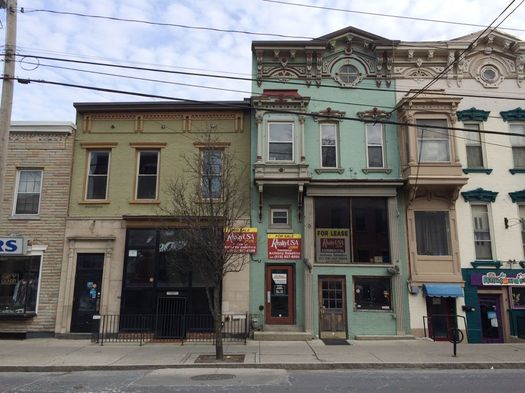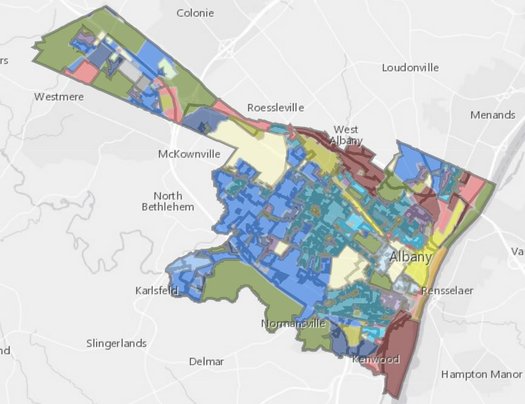The big Rezone Albany process is almost finished

Officials say the buildings at 268 and 288 Lark Street are two examples of how the city's current zoning holds back development.
More than two years after it started, the city of Albany is close to finishing the major overhaul of its zoning -- a process city officials say will make the city's development rules easier to understand and consistent, opening the way for millions of dollars in new development.
The city formally released the final Rezone Albany draft Monday. It's the first major update since 1969. And in the time since, city officials say the city's zoning had become a knotted pile of variances, complications, and inconsistencies. The aim of the new rules is straighten out that tangle.
"One of the things that has struck me through this process is that when we look throughout the cities as some of the challenges that we have in our neighborhoods, particularly challenges with vacant and abandoned buildings particularly commercial, sometimes we found the enemy and the enemy was us," said mayor Kathy Sheehan at a city hall event for the draft's release. "In other words, our antiquated zoning was ... driving a lack of ability to more forward with business decisions that would help our neighborhoods."
We've written about Rezone Albany a bunch over the last few years. And while zoning might sound like some sort of sleep aid, the questions it involves are the sorts of things people routinely get fired up about: What sorts of businesses can open where? How late can they be open? How can old buildings be adapted for new uses? How can neighborhoods suffering from disinvestment gain new life?
Here's a quick example of how the new zoning could potentially simplify things.
286-288 Lark Street
The buildings at 286 and 288 Lark Street in the commercial corridor between Madison Ave and Washington Ave have set vacant since Legends and DeJohn's closed years ago.
And now there's an investor looking to occupy the buildings: Ali Celik, owner of Mercato's and Extra Napkin Grill in Delmar, wants to open a family restaurant there. But, as he explained at Monday's event, he's reluctant to take the leap because doing so under the current rules would involve getting multiple variances.
Here's that list of variances:
+ restaurant serving alcohol
+ tavern
+ use of the second floor
+ operation until 2 am
+ variance for parcel width less than minimum
+ variance for parcel width less than minimum
(The site is two parcels and each would need a variance.)
And under the Rezone Albany rules, the list of required variances would be:
+ tavern
Maybe that first list doesn't look too daunting, but every one of those variances has to be won through time and effort -- and, maybe more importantly, there's no guarantee of getting them. So they add significant uncertainty. (They also represent time and effort the city's staff has to spend on processing the applications for variances.)
Celik said after Monday's event that he'd be ready to move forward with the project the next day after the new, simplified Rezone Albany rules are in place.
Also there Monday: Matt Wagoner, whose development company is looking a large mixed-use redevelopment of the Kenwood property on the city's south side. The site was formerly a convent, and more recently it was used as the campus for the Doane Stuart School. Its current zoning designation includes a single-family low density residential district designation. Under the new rules it would have a mixed-use designation.
The city as it is

The city's proposed new zoning map. Here's an interactive version.
Here's another way at how well (or poorly) the city's current zoning lines up with how buildings in the city are actually used. Chris Spencer, the city planning director, said that approximately 21,000 of the city's 30,000 parcels are non-conforming in some way by area -- that is, they conflict in some technical way with the current rules (example: a property that doesn't have enough frontage on a street). And some 6,000 of the city's parcels are non-conforming by use (example: a bar operating in an area zoned only for residential).
In some ways, that's not necessarily a big deal. But if anyone wants to make changes to those properties -- say, adding a deck -- they're set up for running into a snag that could require a variance.
Spencer said that the Rezone Albany package of rules will match the rules to the reality of many of these properties: 15,000 properties in the first category and 3,000 in the second will become conforming.
"In the end, what the zoning is about is protecting established neighborhoods," Spencer said Monday, "but also making sure we're removing the barriers to revitalizing those neighborhoods that need revitalization."
Lark Street
One part of the Rezone Albany process that's gotten a lot of attention was the attempt to simplify the rules for businesses in the Lark Street commercial corridor. The initial proposal relaxed a lot of the current rules for businesses for things like using a second floor or staying open until 2 am. But it also would have rolled back the closing time for some longtime late-night establishments from 4 am. And in the case of a few, such as the Palais Royale, it would have moved the closing time back to 11 pm (because the Palais is tucked back into a residential section on Jefferson Street).
The city got a local of vocal feedback from business owners in the neighborhood and reformulated the plan. Under the proposal that's now in the Rezone draft, businesses currently operating in ways that would be out of bounds under the new rules -- like the Palais -- will be grandfathered in. And that exception will be attached to the property, so it will continue even if the business is sold.
The exception would evaporate if the property changed uses, though. As Spencer explained Monday, if a grandfathered bar becomes a book store, it would lose the exemption and would not regain it if it switched back to being a bar.
What's next
City officials say there have been more than a hundred community meetings and public events leading up to this point. And there are a few more opportunities for people to offer feedback. (If the Lark Street business closing time situation is any evidence, speaking up can have an effect.)
The current zoning plan on the table is a draft -- it still needs to be approved by the Common Council. It's set to be introduced Monday night at the Common Council meeting, and it will be assigned to the council's planning committee. That group will hear more from the city's planning department at a committee meeting, open to the public, where people can offer comments. The council will also later have a public hearing about the Rezone plan, and that, too, will allow for public comments. Then it'll be up for a vote by the full council.
Richard Conti, the Common Council president pro tem, said Monday the Rezone plan is a priority and he's hoping the full council will vote on it by May.
After the plan is implemented, the city is also planning to review its progress and gather feedback at the six-month mark.
Earlier
+ The draft of Albany's new zoning map is out
+ Imagining possible futures for the neighborhood around UAlbany's downtown campus
+ A few versions of the South End's potential future
+ The next shapes of the Warehouse District and Central Ave
+ Thinking about the direction of Central Ave
Hi there. Comments have been closed for this item. Still have something to say? Contact us.
Comments
High property taxes, excessive regulation, archaic zoning rules, little good private industry, neglected neighborhoods, abandoned buildings.....how's that working out for us???
... said BS on Mar 6, 2017 at 10:03 PM | link
The continued presence of burdensome parking minimums in these drafts is a sign of how Albany is stuck in a 60s era planning mentality. Buffalo recently did a rezone and removed all parking minimums. Parking minimums make it more difficult to start businesses, destroy the character of our neighborhoods, make transit less tenable, and artificially decrease density in general. Why not let the market decide when parking is necessary? We already incentivize parking lots by taxing them at an absurdly low rate.
... said Argus on Mar 7, 2017 at 9:25 AM | link
While the City works out its issues, the people of Albany move on. Lark Street is hardly a walkable, business-friendly area. Our housing stock continues to age and deteriorate with little investment or care. Young people come here to get an education and then most leave. Those who stay go to the suburbs. The "Warehouse District" & a useless Convention Center get attention while Arbor Hill, Mansion District, Pastures, South End, North Albany, Mount Hope, 2nd Ave all fall into disrepair. No jobs, the only businesses are bodegas and payday loan spots.
I used to think Albany was on its way up. Now I'm not so sure.
... said Sean on Mar 7, 2017 at 11:16 AM | link
"And in the case of a few, such as the Palais Royale, it would have moved the closing time back to 11 am"
Editors: Fixed. Thank you.
... said Correction needed on Mar 7, 2017 at 12:25 PM | link
Can't wait to see this come to pass... really hoping it can bring life back to Lark St.
... said Paul G on Mar 7, 2017 at 3:22 PM | link
Despite my general morose tone I am upbeat about the city of Albany. We just have to get out of our provincial 1960-1990's mindset and realize what we gave here. We do need industry, and I don't mean more state workers or health care jobs. We need hi tech, bio tech, pharma, research, finance, and manufacturing. We need less non profits, grass roots organizers, tattoo parlors etc. we can have that stuff too but it doesn't drive an economy and CREATE wealth. Sometimes I feel that the city planners DONT want the city to improve for fear that property values would increase and gentrification would displace people etc....I think they fear they'd have to pay state workers more money! That's not such a bad thing as long as wealth is made available to all.....come on we can do it! I don't think we will get there though with the likes of Sheehan and the common council!
... said BS on Mar 7, 2017 at 3:29 PM | link